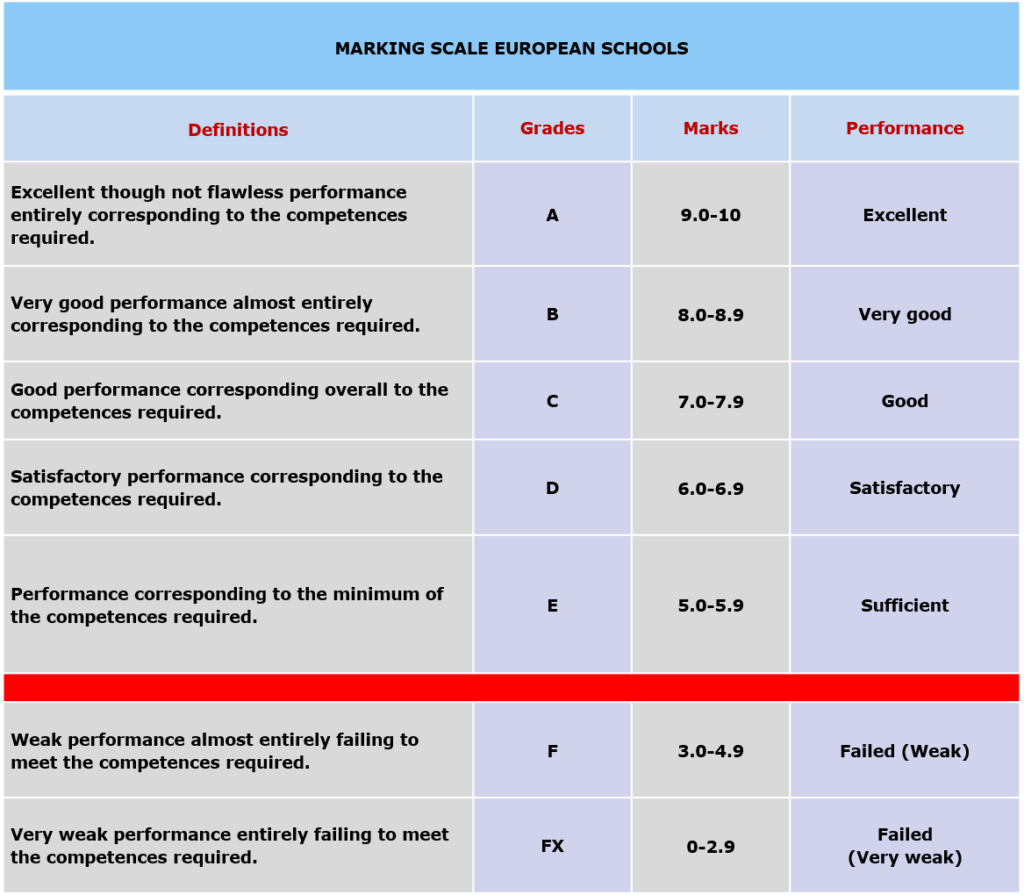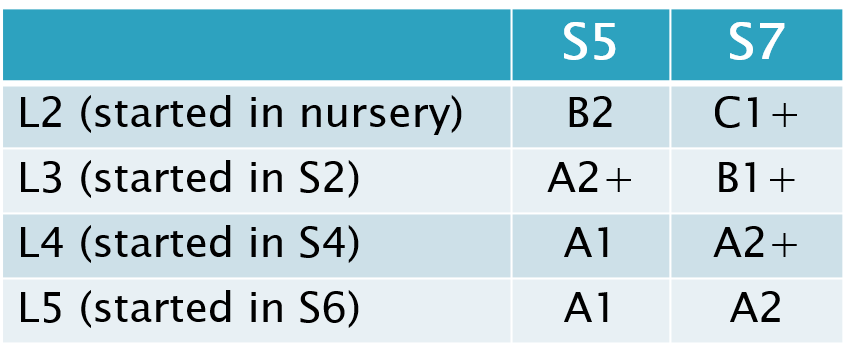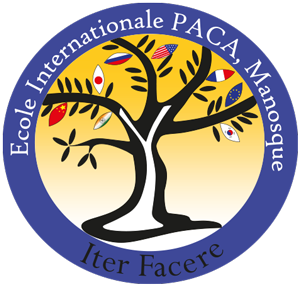European School Manosque, an Accredited European School
An Overview
English is the main language of instruction (80% of teaching time). This European Schooling responds to the needs of those students, from ITER countries, aged 12/13 years, for whom teaching 50 % French and 50 % English would be a handicap for
the preparation of the “Diplôme National du Brevet” at 9th Grade level. A fundamental principle of the European Schools is the teaching of mother tongue / dominant language as first language (L1). This principle implies the pupil’s enrolment
in the section of his/her mother tongue / dominant where such a section exists.
The English language section of European Schooling is aimed at native English speakers. Taking a European Baccalaureate with first language English satisfies English Language requirements for non-native students entering a UK university. A
booklet on the European Baccalaureate can be downloaded from the Department for Education website.
Pedagogical organisation
The pedagogical organisation is designed to reflect and to be consistent with the general principles of European schooling.
- Most subjects are taught in the language of the section (L1) unless otherwise stated.
- Study of a first foreign language (L2 or ‘vehicular’ language: French) is compulsory. The level achieved at Baccalaureate level is equivalent to level C1 of the European Framework of languages and is a higher level than A Level French.
- All pupils learn a second foreign language (L3) from secondary year 1, to be chosen from amongst the following European languages: German or Spanish.
- Pupils have the opportunity to study a third foreign language (L4) from secondary year 4, to be chosen from amongst the following European languages: German, Spanish.
- Language courses are taught to mixed groups of pupils of different nationalities by native speaker teachers.
- Art, music and physical education lessons seek to increase cultural interaction.
- From secondary year 3, history, geography and ethics are taught in the ‘vehicular’ language (L2), as is economics, an option which may be taken from secondary year 4.
- The syllabi which are taught conform to those for European schooling.
Final Qualification: The European Baccalaureate
The secondary school course is validated by the European Baccalaureate examinations at the end of the seventh year. The certificate awarded is fully recognised in all the countries of the European Union, as well as in a number of
others. The Examining Board, which oversees the examinations in all language sections, is chaired by a university professor and is composed of examiners from each country of the Union. They are appointed annually by the Board of Governors
and must meet the requirements laid down in their home countries for appointment to examining boards of the same level.
Assessment
Marking system: For assessment purposes teachers use a marking scale of 0 to 10.
Equivalences between the various marks on the scale and the performance of the pupil are below:

Exams
Pupils in Years 1-3 do not sit formal examinations.
S4-S6 (9th-11th Grade)
After the first semester the pupils will have an A1 and a B1 mark and after the second semester a B1 and B2 mark as well as a final year mark (C mark).
A-mark: for class work, written or oral tasks;
B-mark: the exam mark (or 2 other B tests during the semester not included in the A mark)
The end-of-year mark (C mark) will be calculated on the basis of these four marks: A1+B1+A2+B2. It does not have to be the exact average of these marks but should reflect the level of the pupil at the end of the year.
S4 (9th Grade)
Pupils in S4 will sit written examinations in each subject two times each semester.
These two tests can be taken in one lesson period each or one in one period and the other one in two periods. To prepare the S4 students for the examination situation (in a large exam hall), they take exams with the S5 and S6 students at the end of each semester in L1, L2 and Mathematics. The B marks on the reports for other subjects will be determined by B tests (class tests) during the semester.
S5 (10th Grade)At the end of each semester of S5 there are written examinations in L1, L2, L3, Mathematics, Biology, Chemistry, Physics, History and Geography and the option subjects. The B marks on the reports for other subjects will be determined by B tests
during the semester.
S6 (11th Grade)
There is one set of exams in January and a second set at the end of June. The pupils are examined in L1, L2, Mathematics and all 4-period options. The B marks on the reports for other subjects will be determined by B tests during the semester.
S7 (12th Grade)
Part examinations take place in January. All subjects in which a written examination is taken in the Bac are examined, i.e. L1, L1HL, L2, L2HL, Maths, all 4- period options.
The Baccalaureate written exams take place in early June, and the oral exams take place at the beginning of July. The European Baccalaureate mark is composed of:
- 50% Preliminary Mark – all marks obtained in S7
- 35% Written Exams
- Candidates take five written exams:
- Language 1 English /Advanced Language 1 English
- Language 2 French / Advanced Language 2 French
- Mathematics (3 or 5 periods)
- 4-period option
- 4-period option
- Candidates take five written exams:
- 15% Oral Exams
- Candidates take three oral exams:
- L1 English/ L1 English Advanced
- Choice of:
- L2 French or Advanced L2 French
- History (2 or 4 periods)
- Geography (2 or 4 periods)
- Choice of:
- Advanced mathematics (compulsory for students following course)
- Philosophy (2 periods)
- Language 3
- Language 4
- Biology (2 or 4 periods)
- Chemistry (4 periods)
- Physics (4 periods)
- Candidates take three oral exams:
With the exception of Language 1 and Language 2, no subject can be chosen for both a written and oral exam.
Other Qualifications
The students in the fourth year of the European School do not take the “Diplôme National du Brevet” exams and there are no other official external exams before the European Baccalaureate.
Students may choose to take International GCSEs at the end of the fifth year in one or more subjects and a number of our students choose to take SATs or PSATs.
Characteristics of the curriculum
In years 1, 2, 3 and 4, the syllabi which have been taught from the beginning of the 2009-2010 school year conform to those for European schooling (www.eursc.eu/). The school year comprises 36 weeks and each lesson is 45 minutes.
· Health education and sustainable development education will be provided throughout secondary schooling, using an across-the-board, cross-curricular approach which does not result in a heavier timetable.
- · Throughout schooling from years 1 to 4, the following will be used to describe languages:
- L1 Basic language
- L2 First foreign language or vehicular language
- L3 Second foreign language, studied from secondary year 1
- L4 Third foreign language, studied from secondary year 4
- As from year 3, human sciences (history and geography) and Ethics will be taught in a vehicular language, as will, from year 4, the option course in Economics.
- L3 and L4 will be chosen on the basis of the European languages taught in the school.
Language Proficiency levels
The expected language levels refer to the official document 2013-08-D-11-en-1

See article 47 General Rules of European Schools: If a pupil’s knowledge of a language required for the continuation of his/her education is poor or non-existent because his/her former school followed a different curriculum, his/her legal representatives shall undertake to send him/her to classes in that language
School year calendar
There will be a five-day school week, from Monday to Friday. The school year will be 180 days and the school holidays will be akin to those set by the French Ministry of Education each year.
Enrolment requests
Requests for enrolment must be submitted to the school. Please refer to the forms available on the school’s website.
The choice to integrate into the English language section of the European School will be definitive, pending academic approval; students will not be given the option to change programmes within the school.
Students who are new to school must pass an entrance test.
Further Information
For for all of the official rules and regulations of the European Schools, please see the European Schools website
Or please contact
Mrs Juliet Palmer
Director of Studies for European School Manosque
